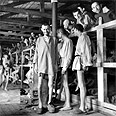
German: I came to ask for forgiveness
Young man arrives in Israel to personally apologize for grandfather's conduct during WWII
The story of German Robin Parkircher (27), hailing from Reinheim near Frankfurt sounds somewhat surreal.
On Sunday of this week, the young man arrived in Israel from Germany and immediately went to visit a senior citizen home in Nordia asking to meet one of its residents, Lili Kertesz.
In a conversation with Parkicher it became apparent that the young German had requested to meet with Kertesz to apologize for the actions of his grandfather, who served as a guard at a women's Nazi concentration camp near Bremen, Germany during WWII.
Some 500 women from Hungary and 300 from Poland were incarcerated at the camp. Kertesz, who is 82 today, was a prisoner at the camp from August 1944 until March 1945 after which she was deported to Bergen-Belsen and only released in April 1945.
Parkircher, a single factory worker, told the Yedioth Ahronoth newspaper that his grandfather had passed away while he was still very young. Years later he found a photograph of his grandfather wearing an SS uniform and started asking questions. His grandmother told him about his grandfathers' service at the camp.
Parkircher decided that he would seek out the camp survivors to ask for their forgiveness on behalf of his grandfather.
No easy mission
The mission wasn't easy of course. Parkircher published several notices on the internet asking for information regarding camp survivors. Several months later, when he had almost given up hope, he received a message from a teacher who had read a book by an author called Lili Kertesz. In the book, Kertesz had written about her incarceration at the camp.
Equipped with this information Parkircher located Kertesz's current residence in Nordia. He sent her several letters, but received no replies as Kertesz doesn't speak or read German. He finally decided to come to Israel. He landed in Israel on Sunday and with his luggage went straight to see Lili Kertesz.
Parkircher spoke to the receptionist who summoned the security guard Leon Margalit. Parkircher explained the purpose of his visit and was escorted to Kertesz.
Kertesz was born in Hungary and came to Israel in 1957. Until three years ago she lived in Netanya and for the past 40 years she has been writing in a Hungarian language magazine published in Haifa. Sunday was an exciting day for her as she had been informed of the birth of a grandchild that same morning. Kertesz was about to leave for the hospital when she was told that someone wished to meet her.
"Obviously I was very moved when the young German came here," she said. "At first I couldn't understand what he wanted and didn't know how to behave. But gradually I understood his motives and by lunchtime we had already become friends."
When asked whether she knew who Parkircher's grandfather was she replied: "How could Jewish prisoners know German guards, we couldn't even look at them so as not to be beaten."
After the two conversed for a while, Parkircher was invited to lunch and he spoke with other residents as well. Residents reported that Parkircher said that since they were mostly Holocaust survivors, he would like to take the opportunity to express his regret and apologize for what had happened during the war.
"It was so moving, we cried," said Margalit the security guard.
Parkircher has still not completed his mission: He has come to Israel for 12 days with a list of the living survivors with whom he wishes to meet to apologize personally. On Monday he is due to be visiting Haifa where he will meet Lili Maor, a Holocuast survivor who several years ago organized a meeting for former camp prisoners.










